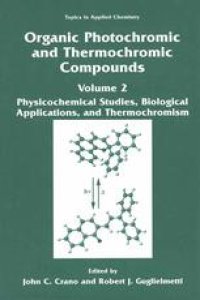
Ebook: Organic Photochromic and Thermochromic Compounds: Volume 2: Physicochemical Studies, Biological Applications, and Thermochromism
- Tags: Electrochemistry, Analytical Chemistry, Inorganic Chemistry, Physical Chemistry, Polymer Sciences
- Series: Topics in Applied Chemistry
- Year: 2002
- Publisher: Springer US
- Edition: 1
- Language: English
- pdf
This book, Organic Photochromic and Thermochromic Compounds, is the fourth major treatise on photochromism involving organic molecules and derived systems. The first such book was edited by G.H. Brown in the Weissberger series in 1971, the second was edited by H. Dürr and H. Bouas-Laurent in the Elsevier series in 1990.
A third book, edited by C.B. McArdle, should be added to the list, which focuses on the very important topic of the behavior of photochromic systems in polymer matrices.
The current book is a result of the large increase in the number of publications and patents concerning photochromic compounds and their use in various applications (e.g. ophthalmic lenses, security printing, etc.) during the last 10 years. As a result of this increased interest, two successful International Symposia on Photochromism have been held: the first, ISOP93, in France on Embiez Island near Bandol (September 12-16, 1993) and the second, ISOP96, in the United States in Clearwater, Florida (September 8-12, 1996). The number of countries represented at each of these symposia (17 and 16, respectively) attests to the international scope of the photochromic research community. This global interest is also exemplified by the authors of the chapters within this book.
The second volume of this new review is focused on the physico-chemical properties and photochromic behavior of the best-known systems, which have led to new developments in the known photochromic series or the discovery of new families.
Chapters are included on the most appropriate physico-chemical methods by which photochromic substances can be studied (spectrokinetic studies on photostationary states, Raman spectroscopy, EPR, chemical computations and molecular modeling, X-ray diffraction analysis). In addition, special topics such as interaction between photochromic compounds and polymer matrices, photodegradation mechanisms, and potential biological applications have been treated. The last chapter, on thermochromic materials, is included to emphasize the chemical similarities between photochromic and thermochromic materials.
In general, the literature cited within the chapters covers publications through 1995.
A third book, edited by C.B. McArdle, should be added to the list, which focuses on the very important topic of the behavior of photochromic systems in polymer matrices.
The current book is a result of the large increase in the number of publications and patents concerning photochromic compounds and their use in various applications (e.g. ophthalmic lenses, security printing, etc.) during the last 10 years. As a result of this increased interest, two successful International Symposia on Photochromism have been held: the first, ISOP93, in France on Embiez Island near Bandol (September 12-16, 1993) and the second, ISOP96, in the United States in Clearwater, Florida (September 8-12, 1996). The number of countries represented at each of these symposia (17 and 16, respectively) attests to the international scope of the photochromic research community. This global interest is also exemplified by the authors of the chapters within this book.
The second volume of this new review is focused on the physico-chemical properties and photochromic behavior of the best-known systems, which have led to new developments in the known photochromic series or the discovery of new families.
Chapters are included on the most appropriate physico-chemical methods by which photochromic substances can be studied (spectrokinetic studies on photostationary states, Raman spectroscopy, EPR, chemical computations and molecular modeling, X-ray diffraction analysis). In addition, special topics such as interaction between photochromic compounds and polymer matrices, photodegradation mechanisms, and potential biological applications have been treated. The last chapter, on thermochromic materials, is included to emphasize the chemical similarities between photochromic and thermochromic materials.
In general, the literature cited within the chapters covers publications through 1995.
Download the book Organic Photochromic and Thermochromic Compounds: Volume 2: Physicochemical Studies, Biological Applications, and Thermochromism for free or read online
Continue reading on any device:

Last viewed books
Related books
{related-news}
Comments (0)